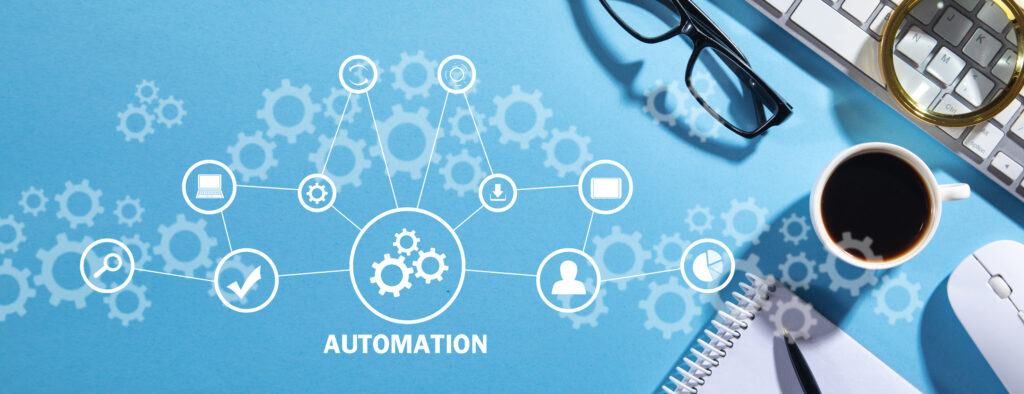Robotic Process Automation (RPA) for Accounts Payable
RPA for Accounts Payable, Finance & Accounting Departments
In the realm of finance and accounting, efficiency, accuracy, and compliance are paramount. Robotic Process Automation (RPA) has emerged as a powerful solution to transform and streamline these departments, allowing them to operate more effectively, reduce costs, and enhance data accuracy. This page explores the specific applications, benefits, and key considerations of RPA in finance and accounting.

What is Robotic Process Automation (RPA)?
Robotic Process Automation (RPA) is the use of software robots or “bots” to automate repetitive, rule-based tasks, mimicking human actions within digital systems. In finance and accounting, RPA technologies can perform data entry, data validation, calculations, and reporting, among other tasks, without human intervention.
Increase Financial Processing Efficiency by Eliminating Manual Work
If you’re like most organizations today, automation of your financial operations through advanced capture and workflow has delivered more efficient and transparent processes, lower processing costs and optimized cash flow. But, with increasing transaction volumes and ever-mounting pressures to do more with less, many organizations are looking for ways to eliminate the remaining manual work and increase the degree of automation across their finance and accounting processes.
Robotic process automation (RPA) is quickly emerging as a solution to extend automation in finance, and recent research reveals that many organizations believe it will have a significant impact on transforming financial processes in procure-to-pay, order-to-cash, and record-to-report, over the next decade.
RPA for finance and accounting can fill gaps in automation and streamline unique processes that exist outside of your core systems and workflow processes by deploying intelligent software robots. This reduces costs and frees up resources to be reallocated to more value-added tasks. Combined with financial process automation solutions, it provides the most comprehensive solution for automation across your finance and accounting processes.
What RPA Can Do For Accounts Payable, Finance & Accounting Departments:
- Data Entry and Validation: RPA can automate data entry from various sources, such as invoices, receipts, and purchase orders, while also cross-verifying the accuracy of the data against predefined rules.
- Invoice Processing: RPA streamlines the end-to-end accounts payable process by extracting data from invoices, validating them, and entering them into accounting systems, reducing errors and processing times.
- Financial Reconciliation: RPA bots can reconcile financial statements, identifying discrepancies in records, and ensuring that balances and transactions match.
- Financial Reporting: RPA can generate standardized financial reports by aggregating data from multiple sources, thus accelerating the reporting process and reducing the risk of errors.
- Audit Preparation: RPA assists in gathering and organizing financial data for audits, improving the efficiency and accuracy of compliance efforts.
- Expense Management: RPA automates expense report processing, from submission to reimbursement, enhancing accuracy and reducing delays.
- Accounting Data Entry: It can be used to automate routine accounting entries and adjustments, reducing manual data input and minimizing errors.
- Data Migration: When transitioning to a new financial system, RPA can aid in migrating data, ensuring data consistency and integrity.
- Customer and Vendor Onboarding: RPA streamlines the onboarding process for new customers or vendors by validating information, conducting credit checks, and populating databases.
- Tax Compliance: RPA helps in automating tax-related tasks, such as tax return preparation and filing, by ensuring that calculations and data are accurate.
Implement Enterprise-Class AP Automation with Any ERP
Process robots automate manual, repetitive, information-driven processes and AP processing is the ideal application. RPA can be programmed to extract invoice data perform database look-ups and even automate 3-way matching.
Using a custom or uncommon accounting software or ERP can make it difficult to find the right automation solutions to support invoice processing and AP automation. Integration for AP delivers connectors that are easy to deploy and flexible to modify against any system—even the most uncommon and customer ERP systems—lowering support costs and helping you solve integration challenges unique to your business.
Benefits of RPA in Finance & Accounting
- Accuracy: RPA bots perform tasks with a high degree of accuracy, reducing the likelihood of errors and inaccuracies in financial records.
- Efficiency: Automation eliminates time-consuming and repetitive tasks, enabling finance and accounting professionals to focus on more strategic and analytical activities.
- Cost Reduction: RPA reduces labor costs associated with manual data entry and processing, thus increasing operational efficiency and cost savings.
- Compliance: RPA ensures that financial processes are consistently executed in compliance with regulatory standards, reducing the risk of non-compliance.
- Scalability: As business needs evolve, RPA solutions can easily scale to handle increasing workloads.
- Speed: RPA bots can complete tasks in a fraction of the time it would take a human, accelerating critical processes.
- Data Security: RPA tools provide secure access control, encryption, and audit trails to safeguard sensitive financial data.
- Improved Decision-Making: By providing accurate and timely data, RPA enables faster and more informed decision-making.
- Enhanced Customer and Vendor Relations: Faster, more accurate processing leads to improved relationships with customers and vendors.
- Auditing Efficiency: Auditors can access well-organized data, making audits more efficient and less disruptive to regular operations.
Streamline eInvoicing Even Further with Portal Integration
eInvoicing promises advances in AP and AR automation but usually delivers a proliferation of networks and standards, and the need to manually transfer files between dozens of portals and your ERP. Transact through a single system and quickly develop robots that pull together the information you need from all of the portals, eliminating manual updates, delays and errors.
Increase Financial Close Efficiency and Confidence
Robotic process automation can help aggregate information across the enterprise, streamline reconciliations, and manage the hundreds of tasks that are triggered between each step of the financial close process. Strengthen internal controls, reduce days to close, control the high cost of financial resources, and tame the chaos of your month, quarter and year-end close.
Process Incoming Purchase Orders Faster
Combine capture and workflow order automation, with robots that can reach out to any system to validate prices or update inventory or CRM systems, and you will automate the processing of incoming purchase orders – one of the most manual processes organizations face today. Experience the benefits of faster purchase order processing, including fewer errors, lower costs and improved customer service.
Redefine Automation Possibilities with a Single Platform
Transform common and unique financial processes with a combination of financial process automation and robotic process automation solutions from a single vendor. Test the limits of your process performance improvement measures with access to the most comprehensive solutions for your finance and accounting problems.

Key Considerations for Implementing RPA in Your Departments:
- Process Selection: Carefully choose the processes to automate, starting with rule-based and repetitive tasks that offer high ROI.
- Change Management: Ensure that the finance and accounting teams understand and are on board with RPA adoption.
- Scalability: Plan for the scalability of RPA solutions as the volume of work increases.
- Data Security: Implement strong data security measures to protect sensitive financial information.
- Maintenance and Monitoring: Regularly monitor and maintain RPA bots to ensure they are operating optimally.
- Integration: Ensure seamless integration with existing financial systems and technologies.
- Compliance: RPA should support compliance efforts, not hinder them. Ensure that automated processes adhere to regulatory requirements.
- Training: Provide adequate training for the finance and accounting teams to work effectively with RPA systems.
Get Ready for The Future of Finance!
Robotic Process Automation (RPA) has the potential to revolutionize the way Accounts Payable, Finance and Accounting Departments operate. By automating routine tasks, it frees up valuable human resources to focus on more strategic and analytical work. RPA offers an opportunity to reduce costs, improve accuracy, enhance compliance, and make financial processes more efficient, ultimately benefiting the entire organization.
